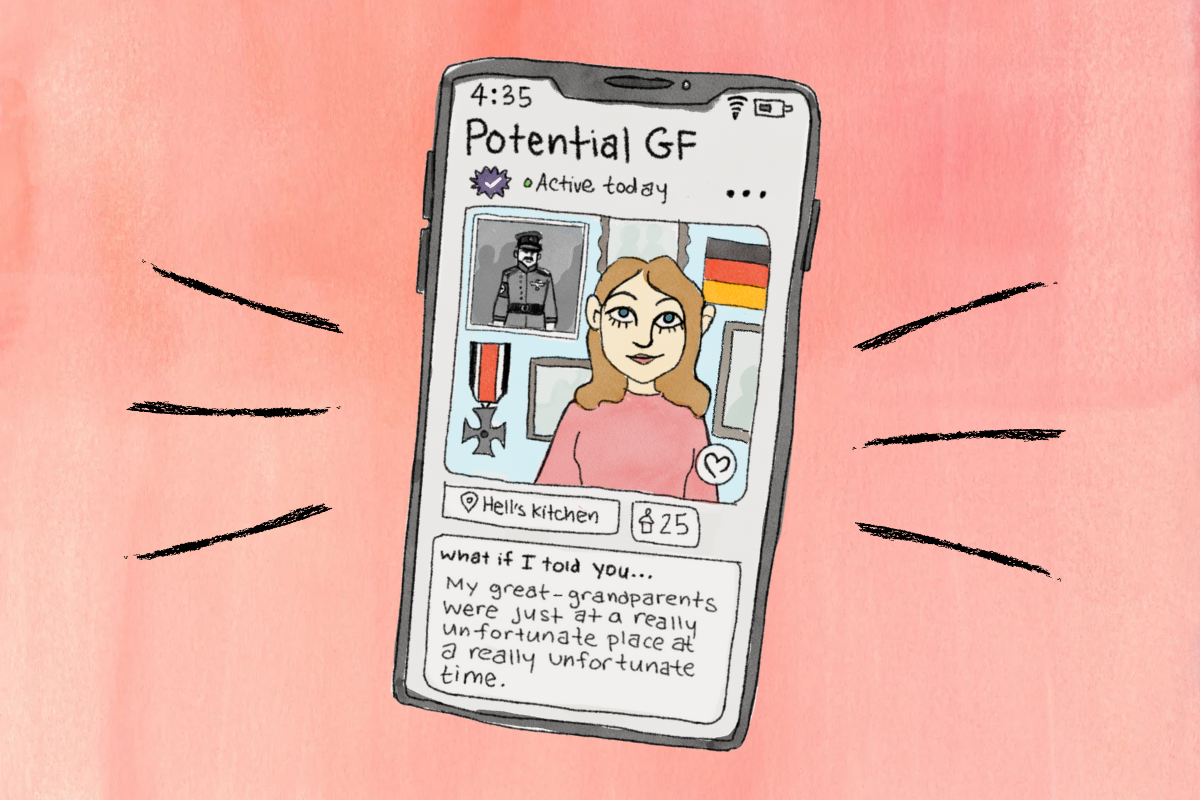I matched with Julia on Hinge in the fall of my senior year of college, and after a couple weeks of exchanging messages on the app, I invited her to dinner. I asked her if she wanted to meet at a place in Midtown, a fair distance between my Lower East Side apartment and hers in Hell’s Kitchen, but she insisted on making the schlep down to my neighborhood. This is how we ended up at a sushi restaurant on Delancey.
I’m not sure how the topic was initially brought up, but about an hour into the date, our conversation veered to the subject of DNA ancestry tests. I recounted my experience taking one a few years prior, and how I insisted on buying a kit despite my parents’ warnings that it would come back 100% Ashkenazi Jewish, only to have to admit that they were right when my results did, in fact, come back as such. This is intended to be a lighthearted anecdote and people usually laugh when I tell it. Julia didn’t laugh.
I asked her if she had ever taken a DNA test, and she looked down into her miso soup as she relayed that she had, and that it had come back 50% German and 50% Lithuanian. “My great-grandparents were just at a really unfortunate place at a really unfortunate time,” she blurted out before I even had the chance to respond. Her impulsive admission caught me off guard. I never would have made that connection — the Nazi connection — had she not offered it up so readily.
Attempting to fill what had now become an extremely awkward silence, I tried to assure her that her ancestors could have been pressured into joining the Nazi party. “Oh, they weren’t pressured,” she clarified. “And they weren’t just members. They were leaders.”
“Um. What do you mean by that?” I asked, now both horrified and extremely curious.
“They helped operate one of the concentration camps,” she explained. “They would decide which people lived and which ones were sent to the gas chambers. After Germany surrendered, they were charged with war crimes and got assassinated. Their baby, my grandma, was then sent to the U.S. to be raised by an aunt. But she’s totally cool. She’s spent her entire life living in places with a lot of Jews. Like New York. And Florida.”
Unsure how to respond, I stuffed a spicy crab roll into my mouth. I had recently started incorporating seafood back into my diet after years of adhering to strict vegetarianism and especially enjoyed my newfound ability to eat shellfish. I suddenly wondered if this odd turn of events was God’s way of sending me a message, commenting on my revived enthusiasm for the unkosher delicacy.
“The 1940s were just a really tough time for my family,” Julia announced, abruptly.
“Same,” I responded, and I watched the implication of what I had just said immediately dawn on her, attempting to stifle my laughter. Her eyes widened in a panicked horror, the tone-deaf nature of her previous comment now glaringly (and almost comically) apparent. In reality, all of my immediate ancestors had immigrated to the United States from Eastern Europe by the early 20th century, decades before the start of the Holocaust — but she didn’t need to know that.
After our plates were cleared and the bill was paid, I walked Julia to the subway. I felt the Tenement Museum’s gargantuan height looming over us as we traversed through its shadows to get to our destination. “Thanks for dinner,” she mumbled, somewhat guiltily, before racing down the station’s grime-stained steps two at a time so as not to miss her train.
We did not go out on a second date, which I’m sure will come as a complete shock to absolutely nobody. It was not so much her close ancestral Nazi ties that dissuaded me from pursuing another one, however — nobody can alter their heritage. Rather, it was the offhand nonchalance with which she relayed the familial connection that ultimately prevented me from asking her out again.
For my grandparents’ generation and generations prior, it was expected that one would only date and marry other Jews, although today many young people feel that that is an outdated expectation. Even my very Jewish parents just shrugged when I asked them if they would prefer for me to date within the community, admitting that a Jewish partner “would obviously be great” but that I should focus on finding someone who treats me well and makes me happy, regardless of religious background. So, when I moved to New York after high school and started to explore the city’s dating scene, Judaism wasn’t a priority when seeking out relationships. It’s not that it wasn’t important to me; it’s more that I simply didn’t think about it, especially given the overwhelmingly casual nature of dating in college. Now, however, I am intentional about discussing my cultural identity with anyone that I consider a potential romantic partner, regardless of how laid-back or new our dynamic may be.
Accidentally getting sushi with a direct descendant of Nazi war criminals (on Delancey Street, of all places) forced me to think critically about my Jewish identity and how it intersects with my dating life in a way I never had before, which I appreciate. More importantly, the experience gave me something even better: a real contender for the best first-date-horror-story of all time. And, because of that, I will forever be grateful to Julia and her lack of a filter. Maybe I should ask her out on that second date after all.



